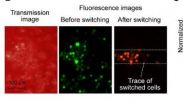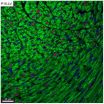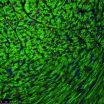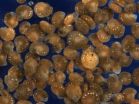(Press-News.org) Mutations in the BRCA1 and BRCA2 genes account for nearly 25 percent of hereditary breast cancers and most hereditary ovarian cancers, yet a study by cancer prevention and control researchers at Virginia Commonwealth University Massey Cancer Center suggests an alarmingly small amount of women who qualify for BRCA genetic counseling actually receive the services. Additionally, they found that a significant proportion of women with a family history of breast and ovarian cancer underestimate their own risk.
The study, published in the April edition of the Journal of Community Genetics, collected data from 486 women over the course of two years. Of these women, 22 met the criteria to be referred for BRCA counseling. However, only one of the women reported receiving genetic counseling and only one reported prior genetic testing. And while perceived risk of developing breast and ovarian cancer was higher among high-risk women, 27 percent of high-risk women felt their risk was "low," and 32 percent felt their risk was "lower than average." Despite having a diverse population, the researchers did not find any significant differences associated with factors such as age, race, family size or the patient's knowledge of genetic testing.
"Despite recommendations from the United States Preventive Services Task Force that primary care physicians screen for hereditary cancer risk, it seems that too few women who meet the eligibility criteria are actually following through with BRCA counseling services," says the study's lead investigator John Quillin, Ph.D., M.P.H., member of the Cancer Prevention and Control research program and genetic counselor in the Familial Cancer Clinic at Virginia Commonwealth University Massey Cancer Center and assistant professor in the Department of Human and Molecular Genetics in the VCU School of Medicine. "Unfortunately, this means that a significant number of women who are at high-risk for developing breast and ovarian cancer may not be taking advantage of preventive measures that could ultimately save their lives."
The researchers analyzed data from a pilot study called Kin Fact (Keeping Information about Family Cancer Tune-up) that was conducted at the VCU Women's Health Clinic. Kin Fact works by having a clinical research associate intervene during a woman's annual gynecology appointment to discuss the patient's genetic cancer risks. Participants were asked to complete a self-administered survey that asked questions about their knowledge of genetic counseling and their perceived cancer risk. After completing the survey, the study's recruiters obtained information about the patient's hereditary cancer risks by noting all breast and ovarian cancers among first-and second-degree relatives. The researchers' goals were to assess the amount of women eligible for BRCA counseling in a primary care setting, explore associations between high-risk status and characteristics such as age, race and genetic literacy, and determine whether high-risk patients received genetic counseling and/or testing.
"We need to examine whether patients are fully aware of their family history, and if there are ways to optimize family history collection in clinical settings," says Quillin. "This will help determine if educational interventions are needed for providers, patients or both."
INFORMATION:
Quillin collaborated on this study with Alexander H. Krist, M.D., M.P.H., assistant professor in the Department of Family Medicine and Population Health at the VCU School of Medicine and member of the Cancer Prevention and Control research program at Massey; Maria Gyure, M.S., C.G.C., research coordinator and genetic counselor in the Department of Human and Molecular Genetics at the VCU School of Medicine; Rosalie Corona, Ph.D., L.C.P., associate professor of health psychology and clinical psychology in the VCU Department of Psychology and founding director of the VCU Latino Mental Health Clinic; Vivian Rodriguez, graduate student in the VCU Department of Psychology; Joseph Borzelleca, Jr., M.D., M.P.H., emeritus professor in the VCU Department of Pharmacology and Toxicology; and Joann N. Bodurtha, M.D., M.P.H., professor of pediatrics and oncology at the McKusick-Nathans Institute of Genetic Medicine at Johns Hopkins University.
This study was supported by National Cancer Institute (NCI) R01 grant CA140959 and, in part, by Massey's NCI Cancer Center Support Grant P30CA016059.
The full manuscript of this study is available online at: http://www.ncbi.nlm.nih.gov/pmc/articles/PMC3955454/
News directors: Broadcast access to VCU Massey Cancer Center experts is available through VideoLink ReadyCam. ReadyCam transmits video and audio via fiber optics through a system that is routed to your newsroom. To schedule a live or taped interview, contact John Wallace, (804) 628-1550.
About VCU Massey Cancer Center
VCU Massey Cancer Center is one of only 68 National Cancer Institute-designated institutions in the country that leads and shapes America's cancer research efforts. Working with all kinds of cancers, the Center conducts basic, translational and clinical cancer research, provides state-of-the-art treatments and clinical trials, and promotes cancer prevention and education. Since 1974, Massey has served as an internationally recognized center of excellence. It offers the most cancer clinical trials in Virginia and serves patients at 10 locations. Its 1,000 researchers, clinicians and staff members are dedicated to improving the quality of human life by developing and delivering effective means to prevent, control and ultimately to cure cancer. Visit Massey online at http://www.massey.vcu.edu or call 877-4-MASSEY for more information.
About VCU and the VCU Medical Center
Virginia Commonwealth University is a major, urban public research university with national and international rankings in sponsored research. Located in downtown Richmond, VCU enrolls more than 31,000 students in 222 degree and certificate programs in the arts, sciences and humanities. Sixty-six of the programs are unique in Virginia, many of them crossing the disciplines of VCU's 13 schools and one college. MCV Hospitals and the health sciences schools of Virginia Commonwealth University compose the VCU Medical Center, one of the nation's leading academic medical centers. For more, see http://www.vcu.edu.
Few women at high-risk for hereditary breast and ovarian cancer receive genetic counseling
2014-05-08
ELSE PRESS RELEASES FROM THIS DATE:
Anti-aging factor offers brain boost too
2014-05-08
A variant of the gene KLOTHO is known for its anti-aging effects in people fortunate enough to carry one copy. Now researchers find that it also has benefits when it comes to brain function. The variant appears to lend beneficial cognitive effects by increasing overall levels of klotho in the bloodstream and brain.
What's more, the improvements in learning and memory associated with klotho elevation aren't strictly tied to aging. They do occur in aging mice, but also in young animals, according to a report published in the Cell Press journal Cell Reports on May 8th. ...
What vigilant squid can teach us about the purpose of pain
2014-05-08
Most of us have probably felt that lasting sense of anxiety or even pain after enduring some kind of accident or injury. Now, researchers have the first evidence in any animal that there may be a very good reason for that kind of heightened sensitivity—or at least there is in the battle of squid versus fish. Squid that behave with extra vigilance after experiencing even a minor injury are more likely to live to see another day, according to a report appearing in the Cell Press journal Current Biology on May 8.
The findings suggest that behaviors that appear counterproductive ...
Antibiotic resistance genes are essentially everywhere
2014-05-08
The largest metagenomic search for antibiotic resistance genes in the DNA sequences of microbial communities from around the globe has found that bacteria carrying those vexing genes turn up everywhere in nature that scientists look for them. The findings reported in the Cell Press journal Current Biology on May 8 add to evidence showing just how common and abundant those resistance genes really are in natural environments.
This big-picture, ecological view on a growing healthcare concern emphasizes the important relationship between antibiotic resistance in the clinic ...
New technology using florescent proteins tracks cancer cells circulating in the blood
2014-05-08
After cancer spreads, finding and destroying malignant cells that circulate in the body is usually critical to patient survival. Now, researchers reporting in the Cell Press journal Chemistry & Biology have developed a new method that allows investigators to label and track single tumor cells circulating in the blood. This advance could help investigators develop a better understanding of cancer spread and how to stop it.
Cancer spread, or metastasis, leads to up to 90% of cancer deaths. Investigators currently do not have the clinical capability to intervene and stop ...
Spurt of heart muscle cell division seen in mice well after birth
2014-05-08
The entire heart muscle in young children may hold untapped potential for regeneration, new research suggests.
For decades, scientists believed that after a child's first few days of life, cardiac muscle cells did not divide. Instead, the assumption was that the heart could only grow by having the muscle cells become larger.
Cracks were already appearing in that theory. But new findings in mice, scheduled for publication in Cell, provide a dramatic counterexample -- with implications for the treatment of congenital heart disorders in humans.
Researchers at Emory University ...
Discovery that heart cells replicate during adolescence opens new avenue for heart repair
2014-05-08
It is widely accepted that heart muscle cells in mammals stop replicating shortly after birth, limiting the ability of the heart to repair itself after injury. A study published by Cell Press May 8th in the journal Cell now shows that heart muscle cells in mice undergo a brief proliferative burst prior to adolescence, increasing in number by about 40% to allow the heart to meet the increased circulatory needs of the body during a period of rapid growth. The findings suggest that thyroid hormone therapy could stimulate this process and enhance the heart's ability to regenerate ...
Polar bear genome reveals rapid adaptation to fatty diet
2014-05-08
Polar bears adapted to life in cold Arctic climates in part by relying on a high-fat diet mainly consisting of seals and their blubber. In a study published by Cell Press May 8th in the journal Cell, researchers discovered that mutations in genes involved in cardiovascular function allowed polar bears to rapidly evolve the ability to consume a fatty diet without developing high rates of heart disease. Moreover, the study revealed that polar bears diverged from brown bears less than 500,000 years ago—much more recently than estimates based on previous genomic data.
"In ...
Using genetics to measure the environmental impact of salmon farming
2014-05-08
Determining species diversity makes it possible to estimate the impact of human activity on marine ecosystems accurately. The environmental effects of salmon farming have been assessed, until now, by visually identifying the animals living in the marine sediment samples collected at specific distances from farming sites. A team led by Jan Pawlowski, professor at the Faculty of Science of the University of Geneva (UNIGE), Switzerland, analysed this type of sediment using a technique known as "DNA barcoding" that targets certain micro-organisms. Their research, which has ...
Humans may benefit from new insights into polar bear's adaptation to high-fat diet
2014-05-08
A comparison of the genomes of polar bears and brown bears reveals that the polar bear is a much younger species than previously believed, having diverged from brown bears less than 500,000 years ago.
The analysis also uncovered several genes that may be involved in the polar bears' extreme adaptations to life in the high Arctic. The species lives much of its life on sea ice, where it subsists on a blubber-rich diet of primarily marine mammals.
The genes pinpointed by the study are related to fatty acid metabolism and cardiovascular function, and may explain the bear's ...
Better cognition seen with gene variant carried by 1 in 5
2014-05-08
A scientific team led by the Gladstone Institutes and UC San Francisco has discovered that a common form of a gene already associated with long life also improves learning and memory, a finding that could have implications for treating age-related diseases like Alzheimer's.
The researchers found that people who carry a single copy of the KL-VS variant of the KLOTHO gene perform better on a wide variety of cognitive tests. When the researchers modeled the effects in mice, they found it strengthened the connections between neurons that make learning possible – what is known ...




